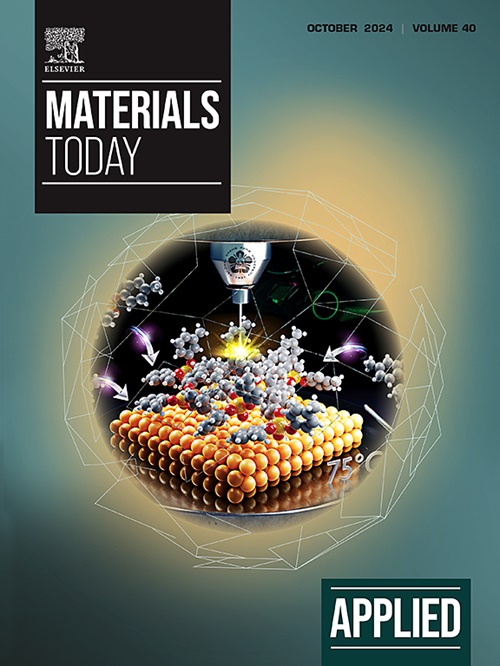Intriguing topological signatures in newly predicted family of Dumbbell C[formula omitted]NX (X [formula omitted] C, Si, Ge) and its quasi-1D derivatives
IF 6.9
2区 材料科学
Q1 MATERIALS SCIENCE, MULTIDISCIPLINARY
引用次数: 0
Abstract
Two-dimensional carbon nitride materials have been the center of attention for their diverse usage in energy harvesting, environmental remediation and nanoelectronic applications. A broad range of utilities with decent synthetic plausibility have made this family a sweet spot to dive into, whereas the underlying analytical aspects are yet to have prominence. Recently, using the machinaries of first principles, we reported a family of six different structures CNX (Jana et al., 2023) with a unique dumbbell-shaped morphology, functionalizing the recently synthesized monolayer of CN (Yang et al., 2017). Here we have critically explored the non-trivial topological phases of the semimetallic Dumbbell CNX sheets and nanoribbons. Spin–orbit coupling induced gap across the Fermi level, its subsequent tuning via an external electric field, portrayal of band inversion from the Berry curvature distribution and the evaluation of topological index using the Wannier charge center (WCC) firmly establishes the traces of topological footprint. The real space decimation scheme and Green’s function technique evaluate the underlying spectral information with corresponding transport characteristics. Fascinating features of these quasi-1D systems are observed utilizing the Su-Schrieffer-Heeger (SSH) model where different twisted phases reveal distinct topological signatures even in a low atomic mass system like DB CN.新预言的 Dumbbell C[式省略]NX(X[式省略] C、Si、Ge)家族及其准一维衍生物中引人入胜的拓扑特征
二维氮化碳材料因其在能量收集、环境修复和纳米电子应用中的多种用途而备受关注。该系列材料具有广泛的实用性和良好的合成合理性,是一个值得深入研究的热点,而其基本的分析方面尚未得到重视。最近,我们利用第一性原理,报道了具有独特哑铃形形态的六种不同结构的 CNX(Jana 等,2023 年),将最近合成的单层 CN 功能化(Yang 等,2017 年)。在这里,我们批判性地探索了半金属哑铃形 CNX 片和纳米带的非三维拓扑相。自旋轨道耦合诱导的费米级间隙、随后通过外部电场对其进行的调谐、贝里曲率分布对带反转的描绘,以及使用万尼尔电荷中心(WCC)对拓扑指数的评估,都牢固地确立了拓扑足迹的踪迹。实空间抽取方案和格林函数技术评估了具有相应传输特性的基本光谱信息。利用苏-施里弗-希格(SSH)模型观察到了这些准一维系统的迷人特征,即使在 DB CN 这样的低原子质量系统中,不同的扭曲相也会显示出不同的拓扑特征。
本文章由计算机程序翻译,如有差异,请以英文原文为准。
求助全文
约1分钟内获得全文
求助全文
来源期刊

Applied Materials Today
Materials Science-General Materials Science
CiteScore
14.90
自引率
3.60%
发文量
393
审稿时长
26 days
期刊介绍:
Journal Name: Applied Materials Today
Focus:
Multi-disciplinary, rapid-publication journal
Focused on cutting-edge applications of novel materials
Overview:
New materials discoveries have led to exciting fundamental breakthroughs.
Materials research is now moving towards the translation of these scientific properties and principles.
 求助内容:
求助内容: 应助结果提醒方式:
应助结果提醒方式:


